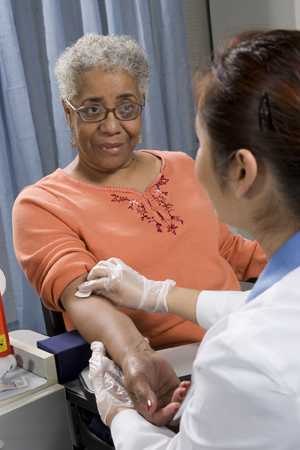Your health care provider will check the health of your kidneys. That way, treatment can be adjusted if needed. They'll also be checked if you have other health problems that affect your kidneys, such as diabetes or high blood pressure.
Tracking your numbers
|
Blood pressure
|
Creatinine level
|
BUN level
|
Keep appointments
Your provider may want to see you every few months. Your visits may include any of these tests:
-
Urine tests. Your urine is checked for protein or albumin, blood, and other signs of problems. A complete 24-hour collection may be used to measure how well your kidneys are working. The tests may be repeated to confirm the results and check if the treatment has been working.
-
Blood tests. These tests measure wastes, such as blood urea nitrogen (BUN) and creatinine, left in the blood. You may have other blood tests to check for health problems caused by reduced kidney function. These include:
-
Low blood counts (anemia).
-
Parathyroid hormone (hyperparathyroidism, which leads to weak bones).
-
Low vitamin D levels (weak bones and other problems).
-
Low calcium and high blood phosphorus levels (weak bones).
-
High or low potassium (irregular heartbeat).
-
Estimated glomerular filtration rate (eGFR) . This helps to measure how well your kidneys are removing waste from your blood.
-
-
Imaging tests. These include ultrasound exams, and CT and MRI scans. They will show damage to the kidneys and blood vessels. Be sure to tell the X-ray specialist (radiologist) that you have kidney disease. Some X-ray tests use dyes that can harm your kidneys.
-
Kidney biopsy. For this procedure, a small amount of kidney tissue is removed. It's then examined under the microscope to confirm some kidney diseases.
To maintain health
Be a partner in your care. Try the tips below to help maintain your health.
-
Stick to your diet. People with kidney disease may need to follow a special diet. You may need to avoid foods that are high in salt, potassium, and phosphorus. You may have to discuss your diet with a nutrition specialist (dietitian). Use your diet to help control any other health problems. These include diabetes, high blood pressure, and anemia.
-
Talk to your provider. Tell your provider before taking any new medicines, either prescription or over-the-counter. Do the same with herbal remedies. Many medicines are flushed from the body through the kidneys. This includes some ointments and creams. Your doses may need to be adjusted, depending on how your kidneys are working. Also, some medicines can hurt kidney function. They need to be avoided.
-
Stop smoking. Smoking can make kidney disease worse. If you need help quitting, talk to your provider about stop-smoking programs and medicines. These can increase your chances of quitting for good.
-
Maintain a healthy weight. Talk with your provider if you need help with managing your weight.
-
Exercise regularly. It helps you stay healthy and may help your kidneys work better.


